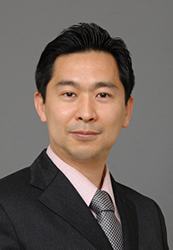Greetings from Professor Nakazawa
 The Department of Ophthalmology of Tohoku University, which was founded in 1917 with Yoshizo Koyanagi appointed as its first Professor, is one of the oldest university ophthalmology departments in Japan. The extraordinary achievements of the members of this department have included the discovery of Vogt-Koyanagi-type uveitis and Kirisawa type uveitis, as well as the development of iris pigment epithelial cell transplantation for age-related macular degeneration and corneal epithelial cell sheet transplantation. As the seventh professor of ophthalmology to lead this department, I, together with our staff, am working to continue this tradition of excellence and carve a new history of achievement in the field of blindness prevention.
The Department of Ophthalmology of Tohoku University, which was founded in 1917 with Yoshizo Koyanagi appointed as its first Professor, is one of the oldest university ophthalmology departments in Japan. The extraordinary achievements of the members of this department have included the discovery of Vogt-Koyanagi-type uveitis and Kirisawa type uveitis, as well as the development of iris pigment epithelial cell transplantation for age-related macular degeneration and corneal epithelial cell sheet transplantation. As the seventh professor of ophthalmology to lead this department, I, together with our staff, am working to continue this tradition of excellence and carve a new history of achievement in the field of blindness prevention.
Tohoku University has a world-renowned department of engineering, which provides a valuable opportunity for collaboration with Tohoku University Hospital’s many departments practicing advanced medicine at the highest levels. The Department of Ophthalmology considers this potential for collaboration one of our main advantages. As one of the most important hospitals in the Tohoku region, and one of the few institutions with the capability of undertaking basic research, our department has the potential to become one of the key research institutions not just regionally, but globally. With the advantage of this remarkable working environment, we as professionals believe that our goal should be to protect the vision of as many patients as we can. Working together and taking pride as members of the Department of Ophthalmology at Tohoku University, we thus aim to realize our true potential as members of this highly capable medical team.
To address chronic eye diseases that cannot currently be successfully treated, it will be necessary to achieve breakthroughs in research. No less than this will be required to find and create new treatments. The aim of the basic research carried out at our department is thus to find radical new concepts in the field of blindness prevention. Our clinical investigations into epidemiology and genetics rely on state-of-the-art medical technology capable of pushing the boundaries of research. Clinical results set the direction of our basic research and allow us to develop ophthalmological uses for new surgical technologies and clinical techniques. Basic research is important because it fosters reasoning abilities in general, which are vital not only to the mastery of technical knowledge and skills, but also for the scientific understanding of test data and other peripheral knowledge, as well as for understanding the true significance of examinations and treatments.
In the field of ophthalmology, many doctors seem to shy away from basic research. The value of a graduate program in basic research, I believe, is that it allows doctors to learn to face new situations by (1) forming a hypothesis, (2) considering the best way to test this hypothesis (3) obtaining strong data to persuade others, and (4) writing a remarkable research paper that will be remembered for a lifetime. This process sets the stage for a lifetime of learning. Only universities large enough to have a sufficient number of experienced staff can provide the kind of environment that makes this possible.
In my area of expertise, the research and development of neuroprotective treatment strategies, we have gained a reputation as among the best in the world. We have expanded knowledge of disease pathogenesis at the cellular and the molecular levels by using various disease models. Currently, we are doing our utmost to bring the results of our research back to the clinic through translational research, as well as through our own efforts to develop novel treatments. Additionally, our ophthalmology lab has carried out the development of drug delivery systems, treatments for retinal disease, and identified the genetic causes of disease, achieving results that have become known the world over and of which I am very proud.
One of the key characteristics of our laboratory is its interdisciplinary nature. Doctors, scientists, engineers and pharmaceutical researchers from the private sector, as well as students from many different countries gather here to engage in discussion and research. Additionally, we also perform collaborative research with both domestic and international outside institutions. We hope to continue our research while always keeping the themes described here centermost.
Our department is always open to those who are interested in our treatment strategies, research and educational programs. Please come and visit us. We hope to begin a new era together here at Tohoku University.

